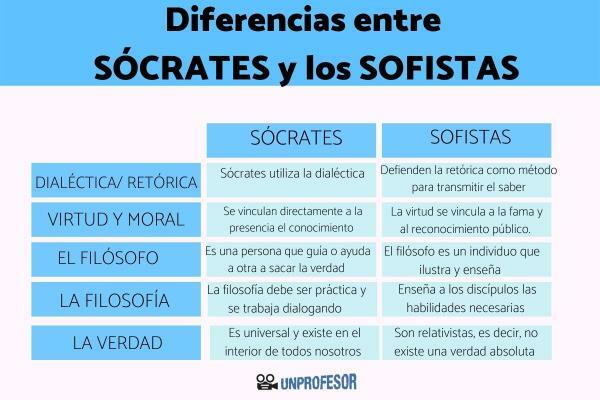Differences between SOCRATES and the SOPHISTS

In today's lesson we are going to travel to Classical Greece (S. Live. C.) to talk about the philosophical differences between Socrates and the sophists. both streams opposite In many aspects, they coexisted in Athens and collided in many of its postulates, such as the fact that the sophists (Protagoras or Gorgias) defended the rhetoric or relative truth and Socrates dialectics and the maieutics to get the truth.
If you want to know more about the Differences between Socrates and the Sophists, keep reading this article because in this class of a TEACHER we explain them to you. We begin the journey!
Before we focus on the differences between Socrates and the Sophists, let's place them in their historical context. Both philosophical currents are framed in a context in which the individual tries to explain the world from the logos/reason and not from the mythos/religion, thus being born the philosophy as a profession.
Likewise, both Socrates and the sophists coexist in a Greece made up of polis with a
assembly democracy, in which all citizens met to discuss public issues in their city and create laws. Therefore, having a rhetoric and a strong speech became a key element in influencing the Assembly's decision-making. A) Yes, the sophists are born and impose themselves in Athens as specialists in knowledge and as masters of rhetoric.However, in this Athens dominated by the sophists (who develop the craft of the philosopher), socrates appears (470-399 BC C) for revolutionize philosophy and teaching: he did not charge for his classes, his classes were aimed at few individuals and his method was fully practical. That is, for him the student had to be an active subject, he should be a participant in his own learning and not limit himself to obtaining knowledge theoretically, as the sophists promulgated. At the same time, he also became an awkward character and hence became known as "The Gadfly of Athens."
Let's get into the matter and know the main differences between Socrates and the sophists. Here we leave you a summary of the 8 most outstanding:
- Dialectic vs Rhetoric: Socrates uses dialectics, which is based on a dialogue (path to reason) between two interlocutors and whose purpose is that one of them helps to find the truth or the knowledge of the other through a series of questions that lead to thinking, to open the mind and to break with preconceived ideas. On the other hand, the sophists defend rhetoric as a method of conveying meaning. to know, which is based on a closed speech and of an encyclopedic nature that is transmitted to some students who limit themselves to listening.
- virtue and morality: For Socrates, virtue and morality are directly linked to the presence or absence of knowledge (knowledge is the greatest of virtues and ignorance the greatest of vices) and, therefore, for our protagonist evil is the absence of knowledge of good and the product of ignorance. Thus, the person who acts badly is not out of wickedness but out of ignorance. For their part, for the sophists, virtue is linked to fame and public recognition. They also defend the moral relativism, according to which, there is no universal way of knowing what is right or wrong and there may be different moral systems that are equally valid, since it is a social construction.
- The figure of the philosopher: For Socrates the philosopher is a person who guide or help another to bring out the truth or the intrinsic knowledge in our soul (maieutics) and does not charge for it. However, for the sophists, the philosopher is an individual who illustrates and teaches another a know prepared and who charges for it.
- The philosophy: For Socrates philosophy must be practice and it works dialoguing (question-answer), therefore, he did not write anything; he considered that writing it was wasting time to do the true philosophy, that it blurred its essence and that it ended up being obsolete. On the other hand, for the sophists, philosophy must be a discipline that teaches the disciples the necessary and key skills for their development in life. politics, that is, to teach the art of oratory (debate and argue) to be a convincing politician effective.
- The truth: According to Socrates the truth is universal and it exists inside all of us (it is innate and latent), therefore, we can know it if we rescue/extract it from our interior. However, the sophists are relativists, that is, they consider that there is no absolute truth and each person has their own vision of reality (“man is the measure of all things”).
- The education: Socrates pretends educate in virtue and morality, that is, in creating fair citizensgood and wise. On the other hand, for the sophists the goal of education is not to create good citizens, but to train good speakers who know seduce, persuade and convince with argumentative tricks, even if it is with a meaningless speech.
- Democracy: Socrates criticizes the democratic system as a form of government, while allowing ignorant (non-political specialists) come to power and make decisions. However, the sophists defend democracy because it is a system that seeks create consensus, however, they also defend that it should be developed by individuals prepared to do politics
- The happiness: For Socrates the happiness does not reside in material goods or money, but in the interior order, in the awareness and balance of your own being. For the sophists, happiness resides more in the public recognition and in more superficial elements such as the fame or power.
Finally, it should be noted that although they highlighted the great differences between Socrates and the sophists, they also they coincided on some issues, such as: the idea of man as a citizen, his interest in ethics and the importance of language as a tool to express reality.



